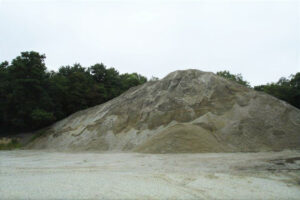Glassphalt Made with Pulverized Glass Sand
Glassphalt is an innovative asphalt that incorporates recycled glass sand. This sustainable solution addresses the challenge of disposing of mixed-color waste glass — typically unsuitable for recycling into new glass containers — generated by most recycling programs. By integrating glass sand into road and surface construction, glassphalt not only diverts glass from overflowing landfills but also enhances national infrastructure with a superior and cost-effective solution.
The technical viability of substituting processed glass for a portion of the natural sand in asphalt has been firmly established. Glassphalt made with glass sand demonstrates increased strength and superior resistance to water damage compared to conventional asphalt.
Glass is inherently durable and capable of continuous recycling without compromising its composition or properties, resulting in a remarkably resilient material. Consequently, surfaces constructed with glassphalt experience fewer potholes and demand significantly less maintenance.
Additionally, glass sand particles hold heat and keep the glassphalt mix warmer longer when paving in cold weather, extending the paving season.

Key Advantages of Glassphalt:
- Durable and High-Quality: Glassphalt is renowned for its durability, offering a long-lasting solution for road surfaces.
- Cost-Effective: Despite initial adjustments in mixing and placement, glassphalt proves to be cost-effective over its lifespan, thanks to reduced maintenance requirements.
- Increased Strength and Resistance: Glassphalt exhibits enhanced strength and resilience to water damage, fatigue, and rutting compared to traditional asphalt.
- Less Maintenance: The advanced durability of glassphalt translates to decreased maintenance needs and fewer potholes, resulting in long-term cost savings.
- Improved Workability: Glass sand particles hold heat and keep the glassphalt mix warmer longer when paving in cold weather, extending the paving season.
Roadway pavement standards require precise mixing and placement. Using glass sand necessitates modifications to traditional asphalt procedures. With these adjustments, glassphalt has emerged as one of the most publicized alternative uses for recycled glass.
Learn more: User Guidelines for Waste and Byproduct Materials in Pavement Construction




